Hefted newsletter #9: April 2025
Despatches from Cumbria and the Lake District, from the team at Countrystride and Inspired by Lakeland
In this month’s news round-up: Wildfire season begins; Rydal Mount yours for £2.5 million; A tourist tax for Lakeland?; Barrow goes Royal; and farewell to John Fox MBE. And… scroll down for the latest from Countrystride; the all-new Keswick Walking Companion; and a 1940s Thirlmere is our Postcard from the Past.
The gather: Pick of the Cumbrian headlines
Firefighters tackled more than 40 wildfire blazes across Cumbria last weekend as the county continued to bask in unseasonably warm, dry conditions. Several on the west coast may have been ignited by sparks from a steam train, leading Network Rail to insist that heritage trains using the coastal line must for now operate with support from diesel locomotives. The fires follow warnings last month that water levels on Derwentwater were “unbelievably low” due to a lack of “significant rainfall” since January. More from The Keswick Reminder.
Is a tourist tax coming to the Lake District? The question is being debated by a new working group set up to examine the pros and cons of charging visitors to the National Park. The Lake District National Park Partnership, which comprises 22 organisations including the National Trust, National Park Authority, National Farmers Union, Cumbria Tourism and the unitary authorities, has formed the group in response to a “sea change” brought about by November’s publication of Who Pays for the Lake District?, a report commissioned by Friends of the Lake District (FLD). Compiled by sustainable tourism expert Dr Davina Stanford, the report outlines the “hidden burdens” placed upon the National Park’s landscapes, wildlife and communities by the 18 million people who visit the Lake District each year. More from The Keswick Reminder.
Powered boats could be banned from the Lake District’s smaller waters to protect their natural beauty and prevent injury to wild swimmers. The Lake District National Park Authority (LDNPA) is consulting on proposals that would amend by-laws to prohibit the use of power-driven vessels from lakes including Grasmere, Bassenthwaite and Buttermere. Windermere, Ullswater, Coniston Water and Derwentwater would be unaffected. The consultation closes on 31 May. More from The Westmorland Gazette.
In Keswick, town councillors have asked Cumberland Council to delay a proposed plan to introduce double yellow lines to the town’s back streets in response to a backlash from local residents and businesses. The unitary authority will undertake a formal consultation in May on car parking in Keswick and surrounding areas, including St John’s and Portinscale. More from The Keswick Reminder.
Rydal Mount, where William Wordsworth spent the last 37 years of his life, is up for sale. The seven-bedroom Grade I listed house, with a tearoom and five acres of Wordsworth-designed gardens, is on the market for offers over £2.5 million. Wordsworth never owned the house, though its current owner, Christopher Wordsworth, is a descendent (his grandmother bought the property in 1969). More from the BBC.
…Meanwhile the owner of Wordsworth’s childhood home in Cockermouth, the National Trust, has announced a recruitment freeze as it deals with a £10 million jump in labour costs. The charity, which owns 20% of land in the Lake District National Park, and manages properties including Hill Top and Sizergh Castle, will pause all but essential recruitment in the face of increased employers’ National Insurance contributions and minimum wage rate rises, which have just come into effect. More from The Guardian.
Lonely wanderers walk this way…. The Wordsworth Way is a new 14-mile literary walking route between Ambleside and Glenridding, tracing some of William and Dorothy’s favourite spots. The Guardian – ‘Poetry in motion’ – took it for a test walk.
Extraordinary wall paintings showing the bold design choices of wealthy Elizabethans have been found at a house near Ivegill. The fantastical black-and-white depictions of “grotesque beasts” and foliage were discovered at The Ashes in Inglewood Forest, a former hunting lodge. “Removing old failing plaster to find these remarkable motifs and faces looking back at us is a moment we will never forget,” said the home’s owners, who were renovating a bedroom when they made the nationally significant discovery. More from The Guardian.
A project to ‘rewiggle’ a stream at an RSPB reserve near Brampton has won a national nature prize. Redshanks and oystercatchers have returned to Howgill Beck, which flows through RSPB Geltsdale and the North Pennines National Landscape, thanks to the reinstatement of natural bends that allow water to spill onto its floodplain. The restoration was judged winner of the UK Rivers Prize, awarded by the River Restoration Centre. More from the RSPB.
Littering, graffiti and vandalism are among the antisocial behaviours that a small minority of visitors are inflicting on Lake District bothies. The Mountain Bothy Association (MBA), which cares for the no-frills shelters, has reported increasing incidences of damage by “the wrong kind of people”. The charity is urging anyone witnessing such behaviour to report it as soon as possible to the police and MBA. More from Cumbria Crack.
Plans for a controversial coal mine at Whitehaven are officially off the table. West Cumbria Mining has withdrawn its planning application to create the UK’s first deep coal mine in more than 30 years after the permission previously granted by the then-government in 2022 was overturned by the High Court last September. Tony Bosworth from Friends of the Earth, which campaigned alongside South Lakes Action on Climate Change to stop the mine, said: “The focus must now switch to ensuring local people get the green jobs they so urgently need.” More from the BBC.
Sellafield bosses have been scrutinised in Parliament over a leak in “Britain’s most hazardous building”. Labour MP Luke Charters told the Public Accounts Committee that the Magnox Swarf Storage Silo leaked enough material every three years “to fill an Olympic-sized swimming pool” and was the nuclear plant’s “single biggest environmental issue”. Sellafield chief Euan Hutton told MPs that the leak was being closely monitored and did not “pose a detriment to the public”. He said the team hoped to empty the silo by 2059. More from the BBC.
Meanwhile, a new video game that re-imagines the 1957 fire at Windscale (now Sellafield) as a Chernobyl-scale catastrophe has been played by two million people in its first month. Ben Fisher, head designer of the dystopian adventure Atomfall, created by Oxford-based developer Rebellion, outlined the challenges in recreating Cumbria as an irradiated quarantine zone: “The lead artist on the project is from Seattle and was mystified by dry-stone walls.” More from the BBC.
Illegal sewage spills into Windermere reached a new record in 2024 according to new research. A study commissioned by campaign groups Save Windermere and Windrush Against Sewage Pollution identified 140 days when sewage was spilled illegally in and around the lake. These illegal discharges were in addition to raw sewage legally released into the lake to stop the sewage network becoming overwhelmed during heavy rain. Following the Government’s pledge last month to eliminate sewage discharges into England’s largest lake, Matt Staniek of Save Windermere called for a legally binding commitment to “clean up Windermere”. “The nation is watching,” he said. More from The Guardian.
King Charles III will confer royal status on the Port of Barrow in recognition of its “critical” contribution to national security. The Government announced last month that the port where BAE Systems is building the nation’s Dreadnought-class nuclear submarines will become The Royal Port of Barrow. More from the BBC.
Thirty women who hauled a one-tonne car up the Kirkstone Pass to raise money for St Mary’s Hospice in Ulverston have smashed their 2019 record. The Mother’s Day team achieved the 3.1-mile ascent from Ambleside in 56 minutes, knocking six minutes off their previous time and raising nearly £8,000 (at time of writing). More from the BBC. Donate at justgiving.com/page/ursula-brendling-1729788699921?utm_medium=FR&utm_source=CL
A campaign backed by best-selling author Helen Rebanks to teach schoolchildren where their food comes from has reached a key milestone. More than 12,000 people have signed a petition calling on the Government to embed food, farming and sustainability into the National Curriculum, necessitating a Government response. Campaigners are now hoping to reach 100,000 signatures by 1 May for the chance to have it debated in Parliament. Rebanks, author of The Farmer’s Wife (we interviewed her on Countrystride #115), said: “Every child in the country should understand the different kinds of farming that we all rely on for our three meals a day.” More from Farmers Guardian.
Tributes have been paid to the Cumbria-based “giant of outdoor theatre” John Fox MBE, who has died aged 86. John founded the pioneering theatre company Welfare State International with his wife, Sue, in 1968 to champion social change through “community-based art and spectacle”. Based in Barrow from 1983, later moving to Ulverston, Welfare State’s influence spread around the world, through fire festivals, lantern parades and sculpture trails. More from Cumbria Crack.
And finally… Staff at YHA Windermere are breathing a sigh of relief that their secret is finally out. The 90-year-old hostel featured in the first episode of the BBC’s Interior Design Masters with Alan Carr on 10 April, but the team had been sworn to secrecy since the series was filmed last June. Ten of its bedrooms were transformed by the show’s budding designers, whose creations can now be enjoyed by guests. More from Cumbria Crack. Watch the episode at https://www.bbc.co.uk/news/articles/cm2x85zy3zko
Out now! The Keswick Walking Companion
New from Mark and Dave at the Countrystride podcast… 16 ambles, rambles and scrambles in and around Keswick.
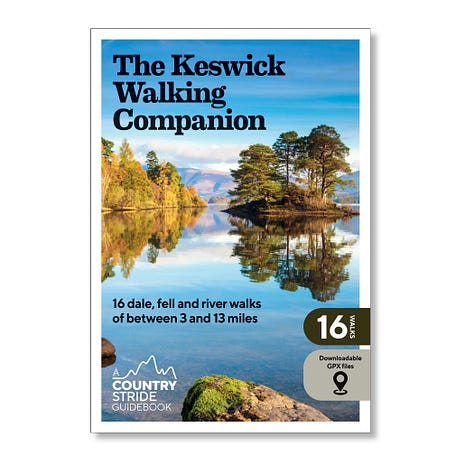
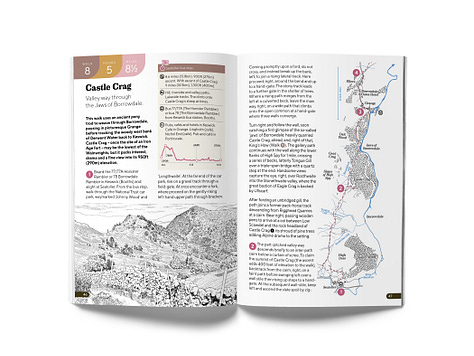
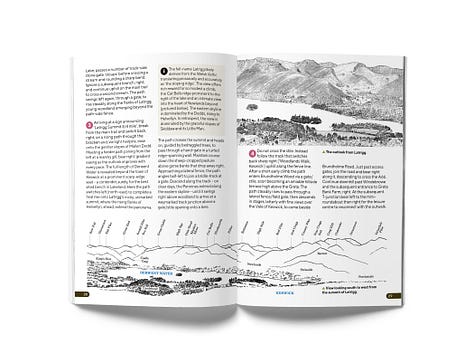
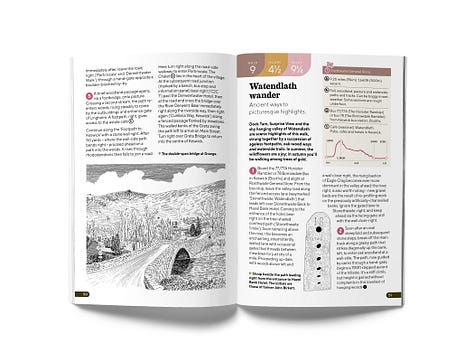
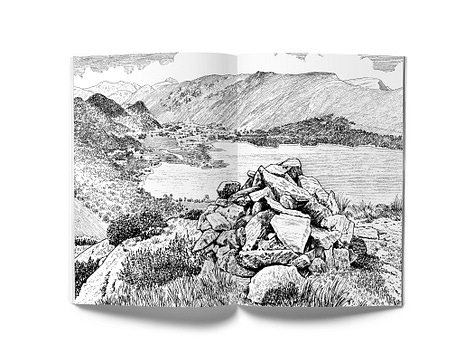
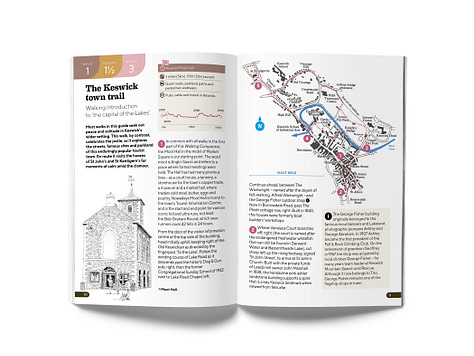
Explore the northern Lake District with 16 unique walks of between three and 13 miles.
Routes from Keswick, Buttermere, Borrowdale, Thirlmere and Bassenthwaite.
Discover dramatic valleys, ancient woodlands, much-loved lakes and little-walked old ways with Fellranger author Mark Richards.
Visit the iconic honeypots of Ashness Bridge, Castlerigg Stone Circle, Latrigg and Surprise View.
Ascents of Cat Bells, Walla Crag, Skiddaw, Castle Crag, High Spy, Causey Pike and more.
From short strolls to full-day expeditions.
Notes on buses, boats, parking, pubs and cafés.
Includes heritage highlights, detailed mapping and downloadable GPX routes.
50p from every copy sold is donated to CATMHS to fund information boards celebrating Keswick’s industrial history.
This guidebook is published by Dave and Mark from the Countrystride podcast.
For more about the Keswick Walking Companion, see inspiredbylakeland.co.uk/products/the-keswick-walking-companion
New! Countrystride #148: Tom Stephenson and Thomas Arthur Leonard – Footsteps to the Lakes
...in which we head south to Pendle Hill to explore the extraordinary lives of two campaigning outdoorsmen who helped establish National Parks, Youth Hostels, The Ramblers and the Pennine Way – 60 years old this year.
In the company of Nick Burton and Bob Sproule from the Pendle Radicals project, we set out from the Lancashire village of Roughlee, where the scene is set for the arrival of the 'two Toms' – a time where workers in the industrial north had to fight to access the hills around them.
Striding onto Noggarth Edge, where views open over the former mill towns of Colne, Nelson and Burnley, we learn about the early life of Tom Stephenson, father of the Pennine Way, who was working in a calico works aged 13, and whose life changed forever on Pendle Hill. Jailed as a conscientious objector during World War I, we follow Tom into his campaigning years, when the concept of his 'Long Green Trail' took root.
Descending to Pendle Water, we introduce the Reverend Thomas Arthur Leonard OBE, one-time minister of Barrow-in-Furness and Colne, whose commitment to social reform – and suspicion of the boozy Wakes weeks – gifted us the Co-operative Holidays Association, and its successor the Holiday Fellowship (he is commemorated in a plaque on Cat Bells).
Arriving at the last-of-its-kind Clarion House, where working class cyclists and walkers still meet for shelter, education and fellowship, we enjoy the cheapest cup of tea in Lancashire, before reflecting on the golden age of access pioneers, and their remarkable legacy.
Postcards from the past
‘Thirlmere, Raven Crag and Saddleback’ – Postmarked Keswick, 17 Aug, 1944
“Played tennis yesterday morning. Climbed Skiddaw pm. Grand weather. Good view to Scotland etc. Also swimming, boating, golf here. Good food. Love to all.”


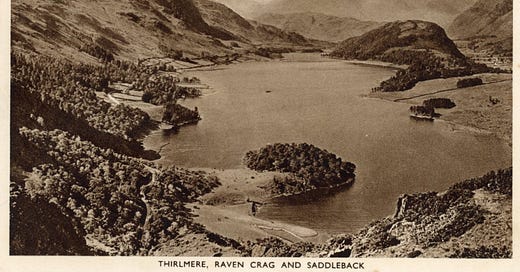

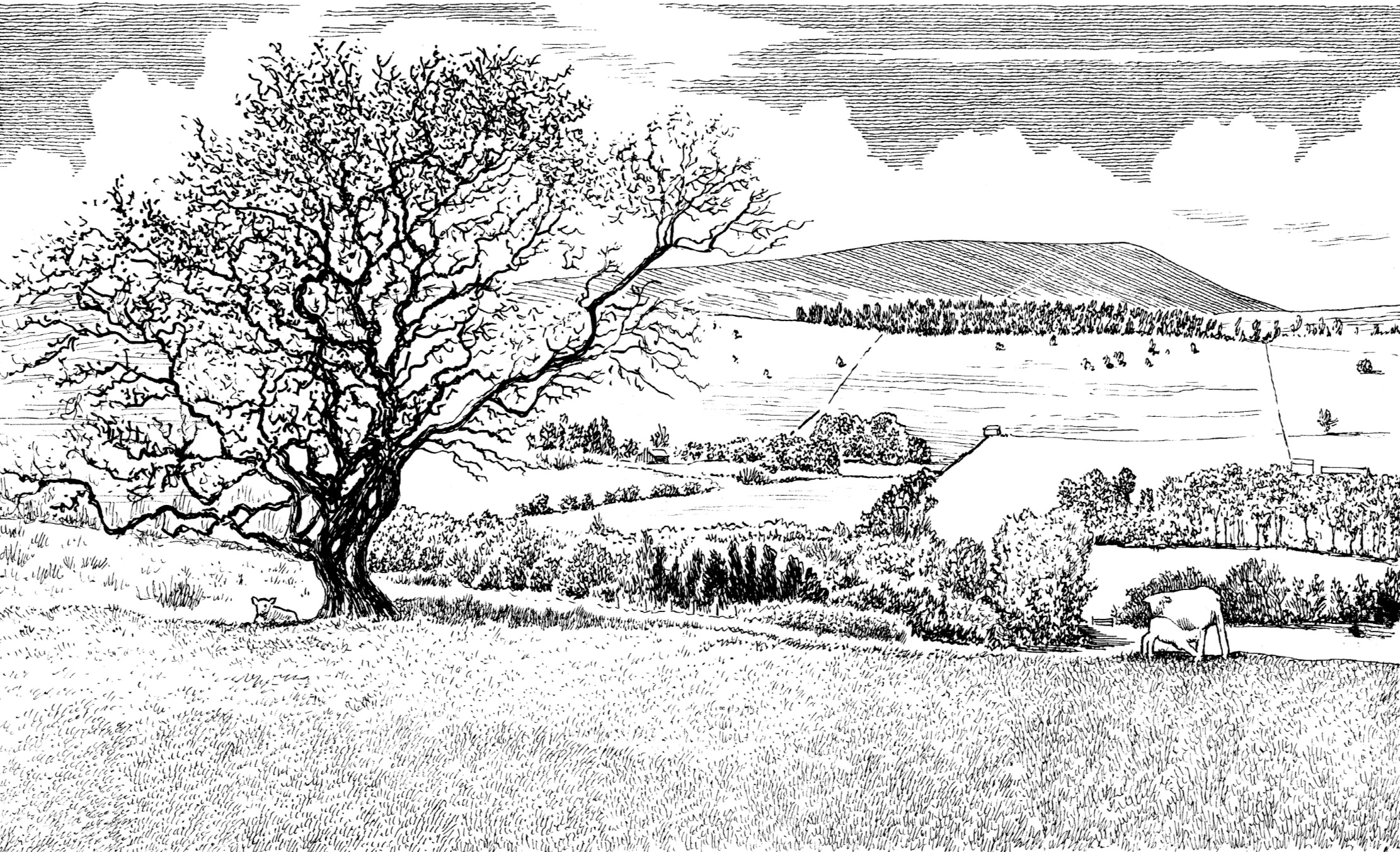
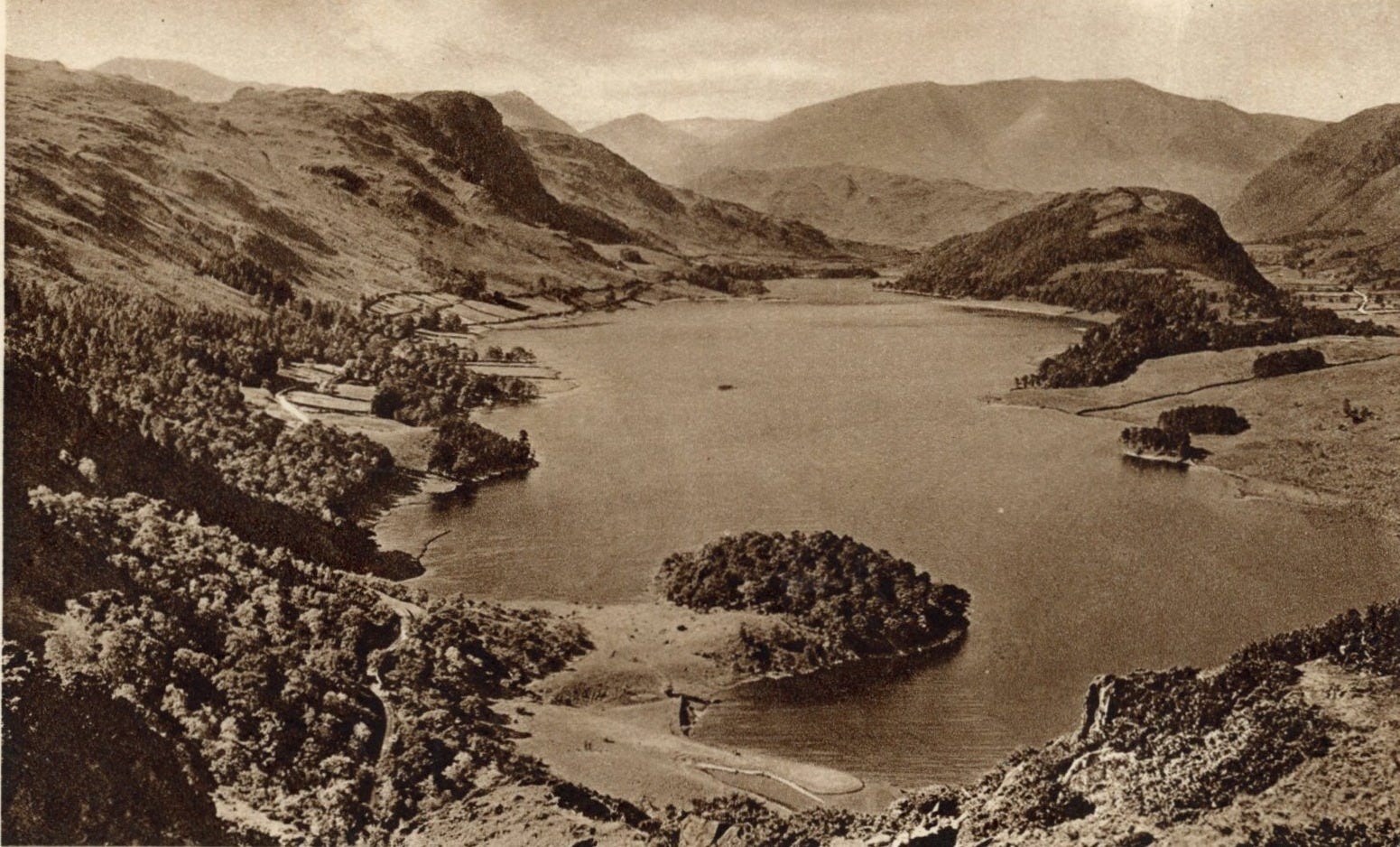
Thank you for all the latest news and l’m looking forward to the Keswick Companion!